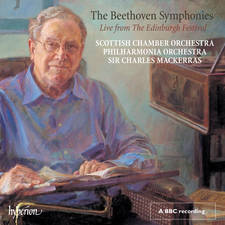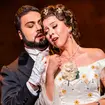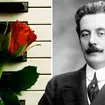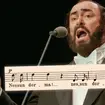Discovering The Great Composers - Puccini
Giacomo Puccini was the most brilliant film composer never to have written for the silver screen. Take almost any scene from his operas and within a short space of time you will sense exactly what is going on.
“He’s so accessible to everyone,” says Jonathan from G4. “His arias really draw you in. They’re so inspiring and spine-tingling. You can still be moved by his work, even if you don’t understand what’s being sung. I have great memories of singing in La Bohème at college. I found the music so moving – if you have the ability, the music performs itself.”
Indeed, Puccini always claimed that his work could be sung in any language yet still be understood. His characters are gloriously uncomplicated, his pacing immaculate, his music absolutely at one with the dramatic situation. He also willingly endorsed the new “realism” in opera – verismo, the Italians called it. In true Eastenders style, lust, betrayal, hatred and murder became the order of the day.
Puccini’s musical touchstones were simplicity and directness of emotion and it is these, above all, that endeared him to his audiences and yet so enraged the critical fraternity. He was also a highly skilled orchestrator, with a rare command of musical structure and stagecraft.
As he memorably put it: “A curtain raised or dropped too late often means the failure of an opera.” He was a perfectionist in all things and struggled throughout his life to find suitable libretti that would come up to his excruciatingly high standards.
“Almighty God touched me with his little finger and said: ‘Write for the theatre – mind, only for the theatre!’” Puccini once confessed. “And I have obeyed the supreme command.”
Whereas many opera composers take a while to get into their stride, Puccini hit the ground running right from the start with Le Villi, premiered in May 1884. Even the critics loved it, one journalist excitedly referring to Puccini as the “next Bizet or Massenet”.
Based on the same story as Adolphe Adam’s ballet Giselle, Le Villi contains at least one heart-stopping number, Se Come Voi Piccina Io Fossi, sung by Anna who dies of grief after being deserted by her fiancé, but who gets her revenge by returning as a ghost and leading him in a dance of death.
Encouraged by this blazing debut, Puccini spent five years slaving over its follow-up, Edgar (1889), a medieval farrago involving a love triangle which ends in murder. The result proved to be his one real flop. The original vocal score says it all, liberally coated by Puccini with such disparaging remarks as, “May God protect you from this opera” and “The most horrible thing ever written”.
Manon Lescaut proved much more successful – its triumphant 1893 Turin premiere secured Puccini’s international reputation once and for all. Some critics ungenerously noted that the storyline about a woman destroyed by her desire for both love and money had been adapted many times before. But Puccini was having none of it.
“A woman like Manon,” he dryly pointed out, “can accommodate more than one lover!”
Following the 1894 Covent Garden premiere, George Bernard Shaw was in raptures: “Puccini looks more like the heir to Verdi than any of his rivals.”
Puccini was now on a roll – at least as far as his audiences and bank manager were concerned. La Bohème (1896), premiered by Toscanini and arguably Puccini’s finest opera, overflows with radiant melody, is sumptuously orchestrated and quickly became one of the hottest tickets in town.
Yet the critics had a field day, bemoaning both the “oriental” harmonies of the third act and the opera’s generally fast-moving, almost conversational style: “It will leave a scant trace in the history of opera,” grumbled Carlo Berzesio in the Gazetta Piemontese, “and the author would be well advised to consider it a passing error.”
So much for critics!
Four years later Puccini hit the jackpot again with Tosca (1900), which caused a sensation at its Rome premiere – and not just because of the music. There was a bomb-scare before the opera had barely got underway, but this seems merely to have sharpened the audience’s dramatic appetite.
Several numbers had to be repeated, culminating in Cavadarossi’s Act III aria E Lucevan Le Stelle – having already been encored it caused such a furore that Puccini was called up on stage no fewer than six times before the audience finally settled. The cognoscenti were somewhat taken aback by the graphic violence of much of the writing, yet it proved one of Puccini’s most enduring successes.
However, nothing Puccini had so far endured prepared him for the roar of jeers and whistles that greeted the 1904 La Scala premiere of Madama Butterfly.
Although the opera’s more leisurely pace did take a while for audiences to adjust to, the audience outcry had been organised by Puccini’s musical enemies, still smarting from his rapid rise to fame. But there was little his detractors could do about it; Puccini was big box-office.
In 1908 alone Tosca was heard in 53 French, 12 Spanish and eight Austrian and German opera houses. La Bohème was more popular, while Butterfly was performed in no fewer than 24 European cities.
It was six years before Puccini produced another opera, La Fanciulla Del West (The Girl Of The Golden West, 1910), which was premiered in the wake of a public scandal – one of Puccini’s servant-girls committed suicide following unfounded accusations that she was having it away with the composer, by his wife Elvira.
The opera’s storyline, in which a saloon mistress falls in love with a stranger who turns out to be a bandit, may sound decidedly left-of-centre for Puccini, but it proved another audience pleaser – no wonder with Enrico Caruso and Emmy Destinn leading the cast!
This time the critics missed the composer’s usual melodic flair, and had difficulty with his “advanced” orchestral sonorities and harmonies. Some complained that the staging was more impressive than the music; while others jibed that it underlined the need for some homegrown, truly American opera.
It was probably as a result of such comments that Puccini’s next opera, the gentle domestic comedy La Rondine (The Swallow, 1917), impressed more due to its skill and deft handling than its passionate lyrical sweep.
Puccini’s detractors had a field day denouncing its easy flow of waltz tunes, the frivolous plot and the fact that he had written it merely for a generous commission because he needed the money (that, at least, was true). But once again, the public loved it. As for Puccini, he just carried on indulging his passion for outdoor pursuits – mostly hunting and fishing.
Accusations of creative burn out were completely rebuffed the following year when Puccini premiered not one, but three new operas – Il Trittico, a trilogy of one-act operas intended to be performed during the same evening. Ironically, the finest, Il Tabarro (The Cloak), a Parisian melodrama brimful of first-rate invention, failed to catch on.
Suor Angelica, the tragic story of a 17th-century nun forced into a convent by her noble family when she gives birth out of wedlock, hardly fared any better. But at least the frothy comedy Gianni Schicchi enjoyed some success, largely as a result of the show-stopping aria, O Mio Babbino Caro.
As a result the other two operas were effectively jettisoned – something that pained Puccini a great deal, and wasn’t helped by Toscanini publicly announcing that he “didn’t like Il Tabarro at all”.
Puccini’s end came quite unexpectedly. In 1923 he began to experience strange pains in his throat, and in 1924 cancer of the larynx was diagnosed.
He was already working on his last great opera, Turandot, and begged Toscanini to look after the work he knew he would never finish.
Despite successful X-ray treatment for the cancer he died of heart failure on November 29, 1924, aged 65. Toscanini was as good as his word, supervising the completion of the final act by the talented young composer, Franco Alfano.
At the work’s premiere Toscanini stopped just after the death of Liù and turned to the audience with barely contained emotion to announce that this was the point where Puccini had laid his pen down for the very last time.
















